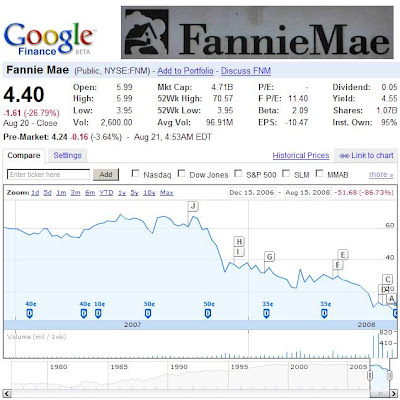

(afp) - Les deux clefs de voûte américaines du refinancement hypothécaire, Fannie Mae et Freddie Mac, faisaient l'objet d'un mouvement de panique mercredi à la Bourse de New York, en raison de rumeurs persistantes sur une nationalisation inévitable, et prochaine.
Les actions de ces deux groupes, longtemps perçus comme inébranlables, ont poursuivi mercredi leur chute libre des dernières séances. Elles ont clôturé en baisse de 22,06% à 3,25 dollars pour Freddie Mac et de 26,79% à 4,40 dollars pour Fannie Mae, des niveaux plus vus depuis près de 20 ans.
La perspective d'un sauvetage orchestré par les pouvoirs publics était considérée comme d'autant plus réaliste par les observateurs que le gouvernement a toute autorité pour intervenir depuis le plan de soutien gouvernemental annoncé mi-juillet.
Fannie Mae et Freddie Mac détiennent ou garantissent 5.200 milliards de dollars de créances hypothécaires, soit plus de 40% de l'encours de crédit immobilier américain. L'effondrement des marchés immobiliers et du crédit plombent les perspectives de remboursement de leurs dettes.
Selon la chaîne financière CNBC, les dirigeants de Freddie Mac et Fannie Mae devaient rencontrer mercredi des représentants du Trésor.
Au Trésor, on a confirmé l'existence "d'une communication avec les deux groupes depuis des mois, au titre de points réguliers", selon la porte-parole Jennifer Zuccarelli.
Le PDG de Fannie Mae, Daniel Mudd, s'est pour sa part défendu de tous problèmes pour son groupe, affirmant sur la radio publique et sur CNBC que "le Trésor n'a jamais proposé son aide et nous ne l'avons pas demandée non plus".
"Nous avons plus de capitaux que nous n'en avons jamais eus", a-t-il également assuré.
Plusieurs médias évoquaient mercredi "l'énorme échec" autour de Fannie et Freddie. Dans un éditorial, le quotidien financier Wall Street Journal a conclu que le secrétaire au Trésor Henry Paulson "n'aura bientôt plus d'autre choix que de mettre en sourdine son autorité et de faire recapitaliser par le contribuable les géants de l'hypothécaire".
Alimentant ce scénario, l'ancien économiste en chef du FMI Kenneth Rogoff a déclaré mardi que "Freddie Mac et Fannie Mae auraient dû être fermées il y a 10 ans" et "doivent être nationalisées".
"Le marché a peur d'une nationalisation" et des pertes sèches que cela signifie pour les actionnaires, résumait Gregori Volokhine, analyste chez Meeschaert Capital Markets.
Pour cet analyste, "une recapitalisation est nécessaire. La question est de savoir si elle va venir du secteur public ou du privé". Côté privé, elle pourrait se faire via des fonds souverains, selon M. Volokhine, à l'instar des richissimes fonds asiatiques et émiratis ayant déjà renfloué plusieurs banques américaines.
"Dans le cas d'une nationalisation, les détenteurs de dette seront sauvés, mais les actionnaires vont perdre leurs investissements", avertit ce dernier.
Les déboires des deux groupes ont déjà eu des conséquences désastreuses pour les actionnaires: la valeur de l'action Fannie Mae a été divisée par 16 en un an, et par 21 pour Freddie Mac. Leur capitalisation n'est plus que de respectivement 5,3 milliards et 2,3 milliards de dollars.
"Le problème de Freddie et Fannie, ce n'est pas leur dette existante, qui est implicitement garantie par le gouvernement américain grâce au plan de soutien de juillet. C'est qu'ils font face à beaucoup d'inconnues", relève M. Volokhine.
"Ils doivent refinancer une grosse portion de leur dette, 223 milliards de dollars, d'ici fin septembre. On se demande si les investisseurs vont acheter cette dette", poursuit-il. "Par ailleurs, le marché a appris il y a quelques jours que ces groupes ont beaucoup acheté de prêts hypothécaires à risques appellés Alt-A, et pour un montant inconnu".
18:55 - 20/08/2008
Copyright © L'Echo
Freddie Shareholders: There's Nothing Left
Fannie Mae (NYSE: FNM) and
Freddie Mac (NYSE: FRE) fell 22.2% and 24.4% yesterday, respectively, unveiling some of the lowest
share prices seen since the late '80s, when the average home cost around $90,000. In perhaps the saddest indication of just how pitiful these
stocks are,
Annaly Capital (NYSE: NLY) -- a small, scarcely followed REIT that purchases Fannie and Freddie securities -- now eclipses the market cap of both Freddie and Fannie. The customer, as they say, is always right.
Fueling the decline was a Barrons article highlighting the truth: There's literally nothing left for common shareholders, particularly for Freddie.
I'm not kidding
At last count, Freddie's shareholders lay claim to negative $5.6 billion in assets, based on mark-to-market accounting. If you missed it, that's negative. Now, as many financial firms have learned lately, mark-to-market accounting may be leaps and bounds from reality. Regardless, investors, regulators, and more importantly, the U.S. Treasury Department could give a flying Freddie about what management "thinks" assets are worth. Negative $5.6 billion. That's the investing equivalent of your doctor entering the room with his head down, clearing his throat, and asking you to have a seat.
Raise $5.5 billion of these and call me in the morning
Consequently, Freddie needs to raise capital. Few disagree on this, including CEO Richard Syron, who announced plans to raise $5.5 billion in capital in May. Unfortunately, waiting has its price: The capital has yet to be raised, and Freddie's stock sits more than 80% below where it was in May. Raising $5.5 billion at these prices will accomplish two things: Bring shareholders' equity to, well, zero, and dilute the pants off any hopes of a rebound.
That said, you would think the stock would now trade closer to zero -- pennies at best. For most companies, it would, but Fannie and Freddie have an implicit government guarantee floating around. That guarantee does wonders to keep these companies alive, but let's distinguish between two very different concepts: Guaranteeing the assets Fannie and Freddie own and insure, and guaranteeing the livelihood of common shareholders.
That's where the Barrons article comes back into play. What scared the dickens out of shareholders yesterday was the reminder that, in the case of government intervention, common shareholders will likely be decimated. As Barrons put it, "It is growing increasingly likely that the Treasury will recapitalize Fannie and Freddie in the months ahead on the taxpayer's dime ... Such a move almost certainly would wipe out existing holders of the agencies' common stock."
This makes a lot of sense. Freddie and Fannie are too big to fail, no doubt about it, but keeping them alive by no means has to include common shareholders. Barrons suggests that any recapitalization would come from preferred shares that would effectively wipe out anything common shareholders held onto.
This should sound sort of familiar. In Bear Stearns' fiercely debated bailout, the $29 billion chipped in by the government went to finance select assets, not into the pockets of shareholders. JPMorgan Chase (NYSE: JPM) took care of that part. In fact, it's possible all public money will be recovered, and the "bailout" won't cost tax payers a penny. That's how it should be.
By the way, we can't afford any of this to begin with
At a time when economic pain hovers around monstrous deficits, everyone knows these bailout programs have limitations. After all, the money to fund them comes from issuing debt ... the same reason companies are in such a pickle to begin with. As George Washington once said, "To contract new debts is not the way to pay old ones."
Besides, If Freddie and Fannie shareholders get bailed out, who's next? General Motors (NYSE: GM)? United Airlines (NYSE: UAUA)? Sallie Mae (NYSE: SLM)? The list could go on. When we're this close to an election, taxpayers are certain to stomp their feet at any attempt to prop up common shares. Privatize profits, nationalize losses? It just won't fly.
Put it all together, and Freddie shareholders seem destined for doom. Barring an astonishing real estate turnaround, there are two outcomes: Either the company remains on its current path, with negative equity and real estate in the throes of disaster, or (more likely) it gets intervention from Uncle Sam, in which case common shareholders get reminded of Aryabhata's greatest discovery: the concept of zero.
Copyright © 2008
Universal Press Syndicate.
... Aryabhata's method of solving such problems, called the
kuṭṭaka (कूटटक) method. Kuttaka means pulverizing, that is breaking into small pieces, and the method involved a recursive algorithm for writing the original factors in terms of smaller numbers. ... (from Wikipedia)
Read More...
Summary only...





